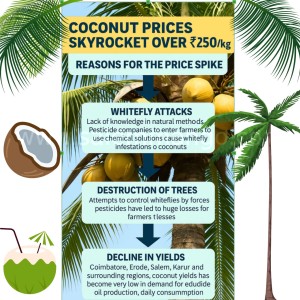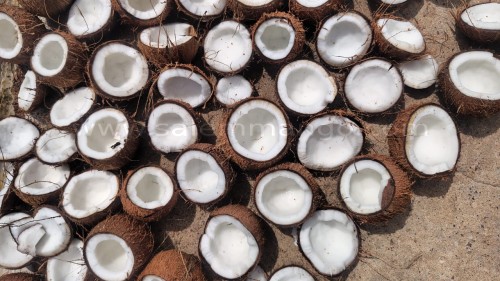3 mins read
Last updated : 23-06-2025
Coconut Prices Skyrocket Over ₹250/kg – What’s Really Behind the Surge?
This year, coconut copra prices have soared past ₹250 per kg and full coconut about Rs120/kg , sending shockwaves across consumer markets and the edible oil industry. While high prices might seem like a sign of demand-driven prosperity, the truth behind this spike reveals a serious crisis in coconut farming — one rooted in pest attacks, misguided interventions, and dwindling natural yields.

The Silent Killer: Whitefly Infestation in Coconut Farms
Across major coconut belts like Coimbatore, Salem, Erode, and Karur, coconut farmers are struggling with a persistent and destructive pest: the whitefly. These tiny insects attack the underside of coconut leaves, sucking sap, weakening the tree, and eventually killing productivity. Once considered a minor threat, whiteflies have now become a major agricultural menace in Tamil Nadu.
Enter the Pesticide Push: A Dangerous Turn
Due to a lack of clear knowledge and accessible natural farming techniques, many farmers were lured into using chemical-based pesticides to control the whitefly menace. This opened the door for large pesticide companies to enter the coconut farming scene, offering aggressive chemical solutions — many of which provided short-term relief, but long-term damage.
Many farmers who turned to these quick fixes were left with dried trees, no yield, and heavy debt.
Declining Yields in Major Coconut Regions
In areas once known for abundant coconut production, large-scale plantations have seen a sharp decline in yield. Even small and mid-sized farms that practice natural or organic methods are struggling to maintain output. The effects are especially evident in:
Soaring Demand, Shrinking Supply Coconut
As a staple in Tamil kitchens and the primary base for cold-pressed oil production, coconut is always in demand. With supply shrinking and harvest volumes dipping alarmingly, prices have naturally surged — touching ₹250 per kg and beyond, depending on grade and quality.
Key drivers of demand include
A Call for Awareness and Sustainable Farming
The current crisis is not just about pests — it’s about the system. Farmers need access to knowledge, sustainable pest control techniques, and encouragement to adopt natural/organic practices. Only by protecting the integrity of the coconut tree and its natural ecology can we ensure a future where prices are fair — not inflated due to scarcity.
What Can Be Done?


The high price of coconuts today is a symptom of a deeper problem — one that affects our farmers, our food systems, and our health. By acknowledging the root causes and supporting sustainable solutions, we can rebuild a coconut economy that is resilient, farmer-friendly, and nature-first.